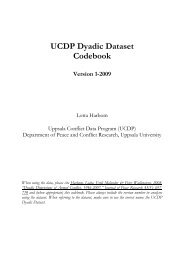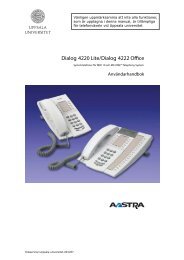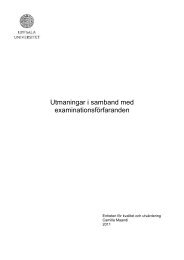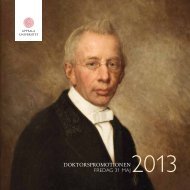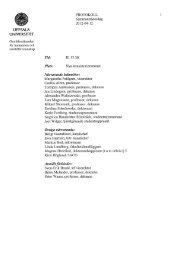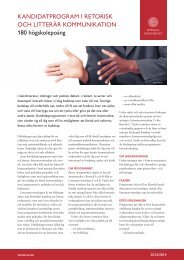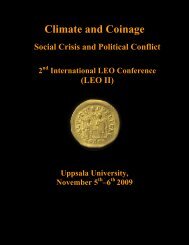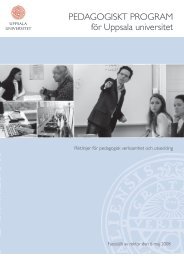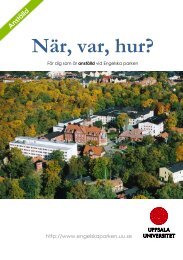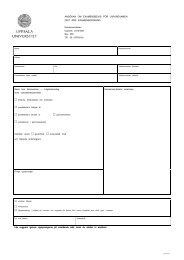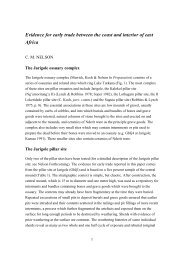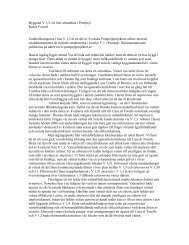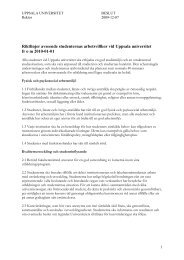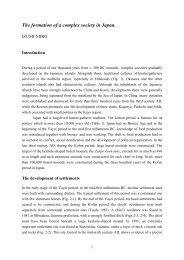Evaluation document, KoF11 Part A: Strategic aspects on research ...
Evaluation document, KoF11 Part A: Strategic aspects on research ...
Evaluation document, KoF11 Part A: Strategic aspects on research ...
Create successful ePaper yourself
Turn your PDF publications into a flip-book with our unique Google optimized e-Paper software.
Uppsala University 1<str<strong>on</strong>g>KoF11</str<strong>on</strong>g><str<strong>on</strong>g>Part</str<strong>on</strong>g> A: Department of Business StudiesA1 i.Introducti<strong>on</strong>The discipline of Företagsek<strong>on</strong>omi exists in several European countries, but has taken <strong>on</strong>somewhat different features in each country. In Sweden the discipline is broad, covering thestudy of all kinds of formal organizati<strong>on</strong>s and almost any aspect of these entities. At theDepartment of Business Studies at Uppsala University a special focus is placed <strong>on</strong> issues ofgovernance of large organizati<strong>on</strong>s, the use of accounting informati<strong>on</strong>, industrial marketing,corporate entrepreneurship and the embeddedness of organizati<strong>on</strong>s in broader societalinstituti<strong>on</strong>s. Research at the Department has a l<strong>on</strong>g traditi<strong>on</strong> of dealing withinternati<strong>on</strong>alizati<strong>on</strong>, internati<strong>on</strong>al business and transnati<strong>on</strong>al organizati<strong>on</strong>s and instituti<strong>on</strong>s.The <strong>research</strong> is organized into five sectors, each dealing with a specific area. Each sector isled by a chaired professor and provides a forum for discussing and developing <strong>research</strong>.Although most scholars are enlisted in <strong>on</strong>e sector <strong>on</strong>ly, there is a high level of interacti<strong>on</strong> andcollaborati<strong>on</strong> am<strong>on</strong>g scholars having their main basis in different sectors. In this way,<strong>research</strong>ers can relate their specific interest to a broader spectrum of <strong>on</strong>going <strong>research</strong> <strong>on</strong>organizati<strong>on</strong>s.Internati<strong>on</strong>al BusinessThe internati<strong>on</strong>al business <strong>research</strong> embraces several areas, which include a number of subtopics.One traditi<strong>on</strong>al area c<strong>on</strong>cerns the internati<strong>on</strong>alizati<strong>on</strong> process of the firm (Johans<strong>on</strong>and Vahlne, 1977). This model points to the gradual character of internati<strong>on</strong>alizati<strong>on</strong> and thevital role played by experience about foreign markets and psychic distance between countries.Our <strong>research</strong> in this area has resulted in some widely cited articles and, lately, the “market–asbusiness-networkapproach” has come to play a major role in the development of this<strong>research</strong>. We are currently investigating some of the basic assumpti<strong>on</strong>s of this model, and wehave also initiated studies <strong>on</strong> the c<strong>on</strong>tinuing internati<strong>on</strong>alizati<strong>on</strong> process of the multinati<strong>on</strong>alcorporati<strong>on</strong> (MNC). The purpose of the latter is to shed light <strong>on</strong> how dispersed experience andresources, within the corporati<strong>on</strong>, are utilized and coordinated in the creati<strong>on</strong> of new businessand market entry. This has not been d<strong>on</strong>e extensively in existing <strong>research</strong>. Moreover, an <strong>on</strong>goingtopic c<strong>on</strong>cerns how internati<strong>on</strong>alizati<strong>on</strong> emerges through opportunity-seeking. In thisaspect, we have adopted a more pro-active role of the firm, rather than the risk-avoiding viewthat was prevalent in earlier <strong>research</strong>.Another area of <strong>research</strong> focuses <strong>on</strong> management of the MNC. In this area, we particularlystudy the emergence of subsidiary centres of excellence, innovati<strong>on</strong> and knowledge transfer.We also study the MNC as a political organizati<strong>on</strong> and investigate sources of subsidiaryinfluence, the tensi<strong>on</strong> between subsidiary roles in the local business c<strong>on</strong>text and the corporatec<strong>on</strong>text, and the related struggle for c<strong>on</strong>trol. The projects embracing this <strong>research</strong> haveutilized and developed the c<strong>on</strong>cept of embeddedness of the MNC (Forsgren et al, 2005). It hasalso stimulated us to initiate <strong>research</strong> <strong>on</strong> the role of headquarters in the MNC. This is a highlyrelevant issue, given the complexity that is usually ascribed to the c<strong>on</strong>temporary MNC.Another growing theme of the group c<strong>on</strong>cerns the cross-cultural impact <strong>on</strong> management inMNCs. In this area we functi<strong>on</strong> as a node for an internati<strong>on</strong>al network of <strong>research</strong>ers. Finally,through our traditi<strong>on</strong> of addressing the interplay between the MNC and its businessenvir<strong>on</strong>ment, we study how the MNC affects host-country ec<strong>on</strong>omies through knowledge2011-02-28 Dept of Business Studies v 1.0



